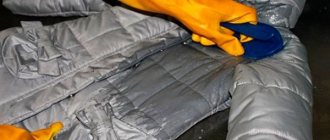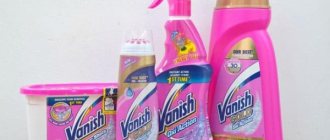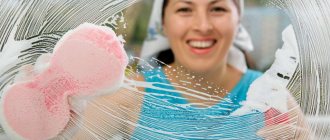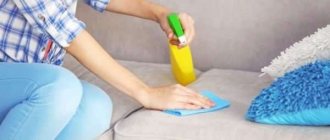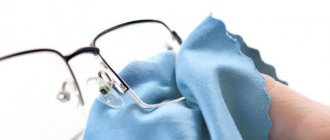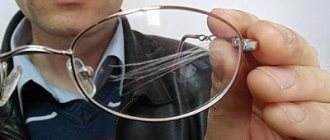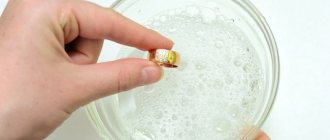Only systematic care can extend the service life of glasses. Opticians and ophthalmologists recommend a combination of dry and wet cleaning. In the latter case, it is not necessary to resort to water. If the frame does not allow you to use it, then it is better to turn to specialized products for optical devices . It is also important to learn the correct ways to use products and tools. Thus, you will protect yourself from unnecessary expenses on repairing old frames and purchasing new frames.
Rules for cleaning glasses
First you need to find out the type of lenses. This is necessary because the materials used to make glass differ from each other in their level of scratch resistance, reaction to chemistry and high temperatures.
With plastic lenses
The plastic is light, flexible, but prone to the formation of scratches and plaque ( precisely plaque, not streaks, the latter are typical for glass lenses ). For this reason, when caring for them, use exclusively:
soft warm water with a minimum amount of cleaning impurities;- products that do not leave streaks;
- liquid chemistry;
- very soft rags, colorless and made from natural fabrics.
Ideally, you need to use specialized wipes. You can buy them at the optician.
Important! Do not use a cloth to clean your glasses that has previously been used for other work. Even if you washed it afterwards, there is no guarantee that the fibers did not absorb fat or detergents that are incompatible with the frame or lenses.
With glass lenses
Breakable, heavy, prone to stains, but resistant to scratches and film deposits on the glass. The latter quality allows you to wash the lenses under running water (do not do this if the frames are metal) and use a variety of products when caring for them, from specialized solutions to dishwashing liquid.
Important! To prevent the product you use from leaving streaks, do not let it dry naturally.
With coated lenses
The film and coating can be damaged, come off, or even peel off from contact with potent substances. Also, do not use on the following lenses:
heated household cleaners;- powdered formulations;
- chemicals containing acetic acid;
- ammonia-based products;
- fat-soluble liquids.
Instead of the options listed, contact a pharmacy or optician and ask them to select a liquid or spray for the care of glasses with filter films or protective coating. Often, such products not only carefully remove all types of dirt commonly found on glasses, but also additionally have a dust-repellent and antistatic effect.
Caring for plastic lenses
The advantages of such glasses are their minimal thickness and weight; even glasses with large diopters will be practically weightless. But plastic lenses are more susceptible to scratches and microcracks, so care for such a product should be more careful.
It is recommended to use a soft microfiber cloth, the water used should be warm, and the detergent should also be the mildest, it is better to use baby shampoo.
If the optics have a special coating:
- You can only use special solutions to clean lenses;
- after the cleaning procedure, the lenses of the glasses should be thoroughly wiped with a microfiber cloth;
- do not use too hot water;
- Do not allow hairspray, perfume or other spray products to come into contact with the surface of the lenses, as this may damage the protective coating. It is better to remove glasses before applying such products.
To keep your glasses looking their best for as long as possible, clean them once a day. Pay special attention to the nose pads and frame. Cleaning your glasses the right way will help prolong the life of your glasses and ensure that your vision doesn't suffer.
What cleaning methods can be used?
Wet and dry cleaning methods using water, specialized and household cleaning products are acceptable. When choosing an option, consider the type of frame and lenses, their condition and recommendations from the manufacturer, which can be found in the booklet or instructions for the glasses.
Napkins and cloths
Specialized napkins are disposable and reusable. The latter, as a rule, are made from microfiber, which effectively and carefully removes dirt and does not leave behind streaks. Traces remain only if a dirty cloth is used . To return it to cleanliness, just use a weak soap solution or regular soap. It is not recommended to machine wash with other items.
Important! Reusable cloths do not require liquid products, but can be supplemented with them. The treatment procedure itself is reduced to mechanical wiping with or without preliminary spraying. Combined use will require washing the cloth (provided that the lenses were seriously dirty or the cloth had already been used for cleaning several times before).
Disposable napkins cannot be washed; they lose their integrity due to such a procedure. But they are often impregnated with special additives that help achieve the best results with minimal effort . Their use is limited to wiping the surface. There is no need to dry your glasses after this.
In addition to specialized napkins and rags, you can also use ordinary soft rags. It is advisable that they be new and not previously used for cleaning other items. The priority is soft and natural fibers, colorless and highly absorbent. The latter quality must be clearly expressed, otherwise streaks may appear.
It’s still not worth using ordinary rags to dry it . This method can be resorted to only in case of urgent need and complete lack of time. It would be much more correct to hold the frame for about a minute under warm water, and only then start working with a rag. At the end of the procedure, place the glasses on another dry cloth . This will allow small fasteners and hard-to-reach places to dry properly.
Important! Water is completely replaceable with specialized cleaning compounds.
Compositions and means
Specialized sprays and liquids are characterized by careful treatment of optical devices. At the same time, they remove all typical contaminants from glass, both organic and inorganic. And their contact with the plastic frame does not lead to the formation of a film. Most of them, in addition to their main function, also cope with a number of optional ones. For example, they act as an antiseptic or antistatic.
Some of them additionally prevent fogging . The topic raised is a pressing problem that arises when there is a sharp change in temperature (in other words, when entering a room from a winter street). Its peculiarity is that such sediment cannot be completely removed by wiping. You have to wait until the frozen glasses can adapt to the room temperature. Treated glass is much less susceptible to fogging . Even if this happens to them, the resulting sediment is easily removed from the surface of the lenses.
Important! When choosing a composition, pay attention to what type of lenses it is compatible with. In addition to universal products that are equally suitable for sunglasses and corrective glasses with any type of lenses, there are also highly specialized products. It is designed for use with a specific type of optical devices and only in combination with them shows decent results.
Recommended sprays and products:
- Good Look. A universal spray that improves light transmission and prevents fogging.
- HD. Solution for glass lenses. It is noteworthy that it can process not only glass, but also all types of frames.
- Spray Clean. A universal option, suitable also for anti-glare glasses.
Anti-fog sprays for glasses
They are special liquids for cleaning optics, including glasses. These sprays contain components that ensure thorough cleaning of glass without streaks. Some liquids have antistatic, antifog and even disinfectant properties. Similar products are produced by (Good Look Antifog), Bentus Laboratories (Sanitelle). These sprays are used as follows: apply it to the entire surface of the glass and wipe gently with a special cloth. This will remove all contaminants. To protect your glasses from fogging, simply spray the lens spray and leave until completely dry.
What should you not clean your glasses with?
Tools and products not recommended for use:
- based on ammonia and vinegar;
- fat-soluble;
- bleaches;
- window cleaning products;
- hard brushes, rough fabrics;
- paper napkins;
- rags with an uneven surface;
- dyed rags.
Important! Scratches can occur even after using a very soft but dusty cloth. Therefore, store wipes intended for glasses in a case or other place that is difficult to reach for small particles of dirt.
Also, do not expose polycarbonate lenses to alcohol-containing compounds, dishwashing detergent (suitable only for glass) and too hot water. Glass ones should not come into contact with powders and chemicals, which leave stains behind.
Caring for glass lenses
The advantages of such lenses include durability and strength. The disadvantages are thickness, weight and massiveness if the glasses are designed for large diopters.
It is safe to clean glass using a lint-free cloth or flannel. And also wash in warm water with detergent.
Important!
If you don’t have time to wait for the glasses to dry, then gently blot them with a paper napkin, but under no circumstances rub the lenses with anything. And this procedure cannot be repeated often.
How to clean lenses to avoid streaks?
First, it should be clarified that glass and window cleaners are not suitable for optical devices . They wash away ultraviolet protection and often contain substances that have a negative effect on lenses.
Next, we’ll go through the tools and ingredients that will help avoid streaks. Disposable specialized optical wipes are impregnated with compounds that prevent the formation of whitish deposits. However, you should not rely on sanitary napkins and options for wiping equipment screens . The former will not help in any way, and the latter do not have the necessary number of characteristics specifically for working with lenses. In other words, their properties are sufficient for high-quality cleaning of displays, but glasses glasses are more demanding.
All dry rags must be kept immaculately clean, not used for wiping non-optical devices, and washed promptly . Only strict adherence to all 3 described rules can become the basis for cleaning lenses without streaks.
Important! Microfiber cloths are washed every 2-3 lens cleanings. We are talking about a daily procedure.
You should also be concerned about the quality of the water used . Hard and containing a large amount of impurities will definitely leave a film. Moreover, the plastic support will also begin to accumulate whitish “prints” from contact with it over time. And it will be extremely difficult to remove them from the frame itself.
About professional products
What to look for when choosing a cleaning liquid or spray:
- On the composition. It should be gentle, without aggressive components.
- Purpose. What kind of lenses is the product intended for cleaning: glass or plastic?
Use specialized products according to instructions. Approximate algorithm: apply the cleaner to the glass using a dispenser. Using a microfiber cloth purchased from an optician, gently rub the lenses without pressing. Greasy marks and stains will be removed without a trace.
As a rule, such products, in addition to cleaning properties, are endowed with one or more additional ones: the formation of a protective film, which significantly reduces the risk of scratches and “prevents” repeated rapid contamination, providing an antistatic effect, increasing the level of lens fogging resistance.
An alternative to liquids, sprays and microfiber are optical wipes with special impregnation . They are easy to use: dries instantly without streaks. There are universal ones that are suitable for cleaning both eyeglasses and sunglasses, as well as for smartphone screens, etc. Studying the instructions is mandatory; there may be restrictions on use, for example, for sunglasses with acrylic lenses.
Is it possible to clean without microfiber and spray?
It’s possible, but not due to the impact of the edges of clothing on the lenses, and it’s not even a matter of suitable material or its uselessness in the matter of caring for glasses . It’s just that this part of the items gets dirty the fastest. Even if you don't see obvious signs, the item still isn't clean enough. And its use can lead to both the appearance of new stains and the formation of microcracks.
If the problem is the lack of microfiber, then it can be replaced with suede cloth napkins . This option is more suitable for glass lenses. Plastic ones can be wiped with a good cotton cloth.
If the difficulty is caused by the lack of a spray, then a soap solution will come to the rescue . After using it, the lenses will need to be rinsed with running water, blotted thoroughly with a rag and the glasses placed to dry on top of another non-wet rag.
Important! Before any type of cleaning, be sure to wash your hands thoroughly. The same action, together with drying the palms, is carried out before the final wiping of the glass.
The procedure for applying the product itself - be it shampoo (option for plastic) or dishwashing detergent (solution for glass) - is as follows:
- Prepare a container with warm water in advance, select a rag and a product;
- Using your thumb and index finger, apply the cleaning agent evenly to the surface of the lenses;
- then the soap suds are washed off in water;
- glasses are wiped;
- dried;
- are being considered for divorce;
- If there are residual detergent or foreign traces, the lenses are wiped again.
This method only works with slightly dirty glasses and is mainly suitable for routine cleaning (just wash glasses with water 2 times a month, with a product - at least once every 4-5 weeks). If a stain that is difficult to remove has formed on the optical device, then you will have to make more efforts when applying the product. You will need to rub the dirt with your index finger and thumb (use them at the same time, this will not squeeze out the glass), and then leave the cleaning solution on the glasses for 20-30 minutes.
Important! Some types of stains can also be removed from glass using toothpaste.
The listed methods, tools and products should not be used on glasses with a special coating . Such products must be processed exclusively with proven and reliable “non-folk” options.
Types of glasses in glasses
There are 2 most common types of material from which vision correction glasses are made:
- Glass. The model turns out to be quite thick and heavy. But, despite this, many patients choose this particular material, as it successfully corrects a severe decrease in visual acuity. The model is difficult to scratch and rarely cracks. It can be wiped without fear of cracks appearing if pressed too hard.
- Polymer plastic. The most common type of glasses. They are easy to wear, convenient, comfortable, and low weight. The disadvantage is that the surface of the lenses is more traumatic. They often get scratches, and there is a high risk of cracks forming with minor impacts. When wiping, be careful not to damage or crack the lenses.
The cleaning method will vary depending on the lens material you choose, but all fixtures will remain the same.
How to clean the frame from dirt?
It is recommended to combine the procedure with cleaning the lenses using detergents . In this case, the glasses are wiped first and only after that a soap solution or foam is applied to the temples and the front frame of the glasses.
For the convenience of the procedure and a better result, use cotton swabs . Sprinkle a small amount of detergent on them and then wipe down any areas that need cleaning. If you don’t have chopsticks on hand, you can use a toothbrush with the softest bristles as a replacement.
Important! When using a toothbrush, be careful not to let it come into contact with the surface of the glass. This will definitely lead to scratches and microcracks.
For very persistent and severe stains, you should try using toothpaste. At the same time, you need to be realistic and understand that sometimes marks on plastic that are mistaken for dirt are nothing more than the first signs of its delamination, and the metal frame may well oxidize and begin to rust . In both cases, cleaning is not a recommended action. You need to go to the optician and order a new pair.
Can glasses lenses be washed with regular soapy water?
If you have nothing to wipe your glasses with, that is, there are no napkins or sprays specially designed for this at hand, hot water and soap will come to your aid. First, rinse your lenses with warm water. Dissolve soap in water and apply the foam that forms on its surface to the glass. Rub them with your hands and rinse again with clean water. After drying, there should be no streaks on the lenses. During the care process, you can also clean the frame. Use cotton swabs for this. The “disadvantage” of this method of care is the impossibility of using it outside the home.
How to dry glasses correctly?
Useful notes and recommendations:
- If the glasses were washed under water, be sure to shake them off, and only then proceed to dry them with a microfiber cloth.
- When working with rags, do not move randomly. Move in one direction.
- Don't use too much force. Movements should be light and circular.
- First, the glass is wiped, then the nose pads, and then the frames and temples themselves.
- The decorative elements of the frame and the fasteners connecting the temples can accumulate moisture and it will not be possible to dry them by simply wiping them with a rag. Therefore, it makes sense to let the glasses sit for a while after washing . If you do this, you will be able to preserve the original consumer properties of your optics longer.
Crochet openwork booties
How to properly place shoes in the hallway
Why wipe your glasses?
Experts recommend wiping your glasses as needed, since dust and skin particles, cosmetic residues, and greasy stains constantly accumulate on the glasses. As a result of such lens contamination:
- their transparency is lost;
- the image becomes unclear;
- a rainbow outline appears.
Decreased optical performance of glasses is harmful to health. The eyes become more strained. They turn red and begin to get tired quickly.
